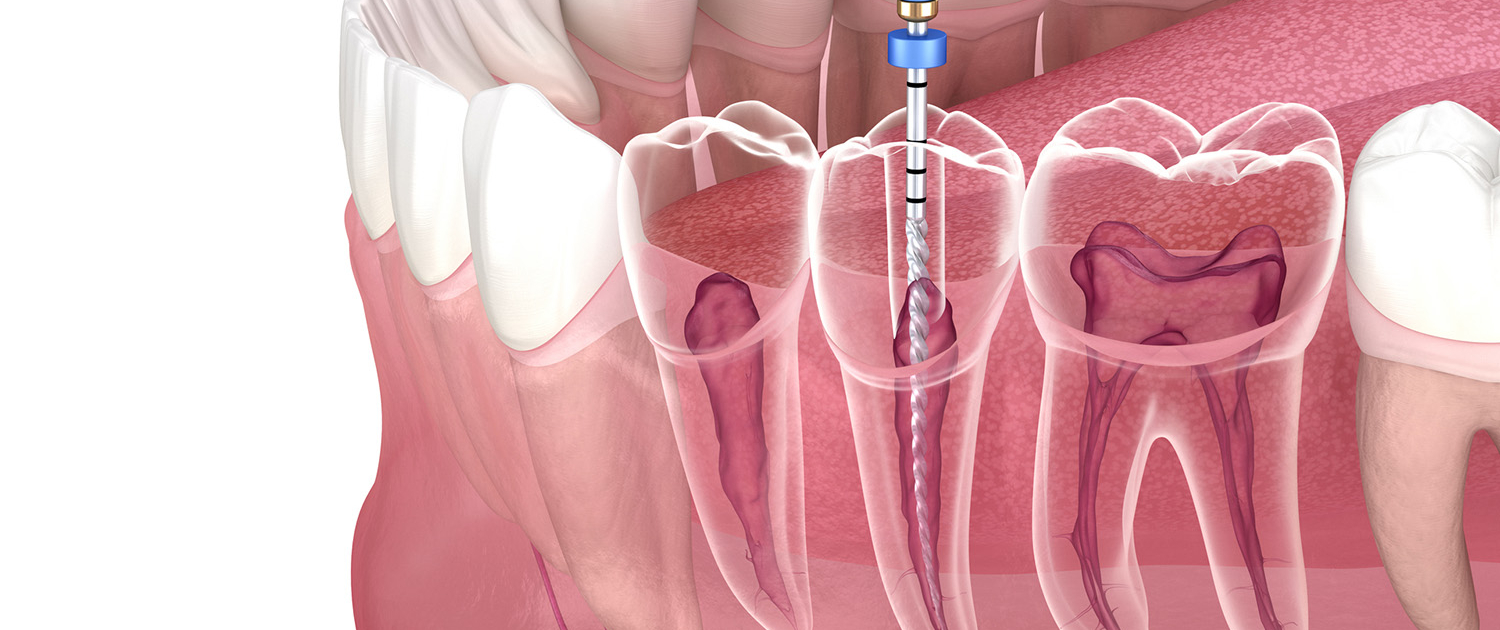Endodontic treatment or root canal treatment for healthy and natural teeth
The root canal treatment or otherwise endodontic treatment is a treatment that is performed inside the tooth and consists in the removal of the nerve and the blood vessels with a series of special small tools.
When does a tooth need root canal treatment?
The endodontic treatment is done when the pulp or otherwise “nerve” of the tooth is infected because there is inflammation or death/ necrosis as a result of destructive caries, fracturesthat involve the pulp in depth, injuries (for example hit with a ball, fall from a bicycle etc.) or when there is an abscess, acute pain and swelling.
The symptoms that usually indicate that a tooth needs root canal treatment are pain and swelling, which can be very intense and extensive. The pain initially appears only during chewing, it can become more acute when we lie down and then gradually it becomes more persistent and continuous.
How is performed the root canal treatment?
Initially, depending on whether the tooth has died or not (necrotic or not), it is decided whether to perform local anaesthesia. A special isolator called dental dam is placed so that the area remains as clean as possible (keeping the saliva away) and there is no risk of the patient swallowing liquids or small tools. Then the decayed tissue, if any, is removed and a cavity is opened in the centre of the tooth through which the dentist with the help of special micro-tools and antiseptic liquids reaches the root or roots of the tooth and removes the nerve from inside them. Finally,the dentist seals the root canals with a material called gutta-percha.
After the endodontic treatment is completed, the tooth is restored, i.e., the cavity that was originally opened is closed and the part of the tooth that may have been broken or decayed is “built”. When there is extensive damage to the tooth and a small amount of healthy dental tissue is left, the reconstruction is done by placing an endodontic post. Then, as teeth that have undergone endodontic treatment are weaker and tend to break more easily, it is recommended to place a case or crown.
If after the end of the treatment the tooth starts to turn black or if it was already black since the beginning, then internal whitening is applied, or a crown or veneer is placed depending on the position of the tooth in the arch.
How many appointments are required to perform a root canal treatment?
Taking analgesics or painkillers is recommended when there is pain before or after treatment. Regarding taking antibiotics, we should always consult our dentist. Antibiotics are considered necessary in cases where, in addition to pain, there is also significant swelling.
Does the endodontic treatment require getting medication?
If the interested tooth is alive, the endodontic treatment can be completed in asingle session lasting from 45 minutes to 1.5 hours. In cases where the tooth is dead and accompanied by swelling or severe pain, it is preferable to complete the treatment in 2 sessions in order to place inside the root canals special materials that lead to good antiseptic and therefore higher success rates of treatment.
Can a tooth that had undergone root canal treatment ache again?
A tooth that had undergone root canal treatment can ache again after the endodontic treatment and this is usually due to insufficient cleaning of the root canals, so it is recommended to repeat the treatment. Other reasons that may lead to pain are the fracture of the treated tooth,especially in the case in which after the endodontic treatment no case or crown has been placed, or improper closure (tooth that does not press well with its competitor) after the restoration of the treated tooth.
How much does an endodontic treatment cost?
The cost of an endodontic treatment depends on the number of roots of the tooth and therefore the treatment of a single rooted front tooth costs less than the treatment of a two – rooted or three – rooted posterior tooth. Another factor that differentiates the cost is the possible use of special antiseptic materials or materials other that gutta-percha for the sealing of the root canals. Finally, it is worth noting that the repetition of an endodontic treatment costs more than the initial treatment.

